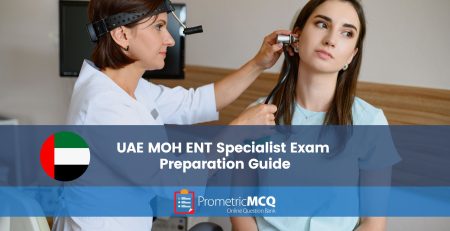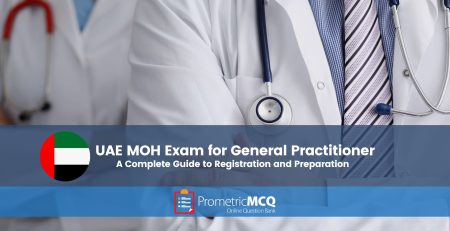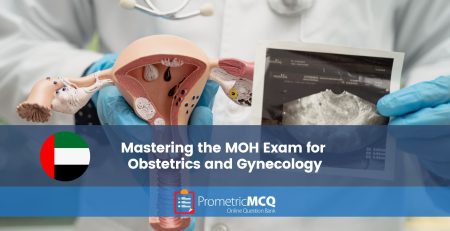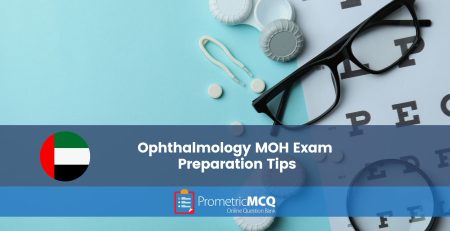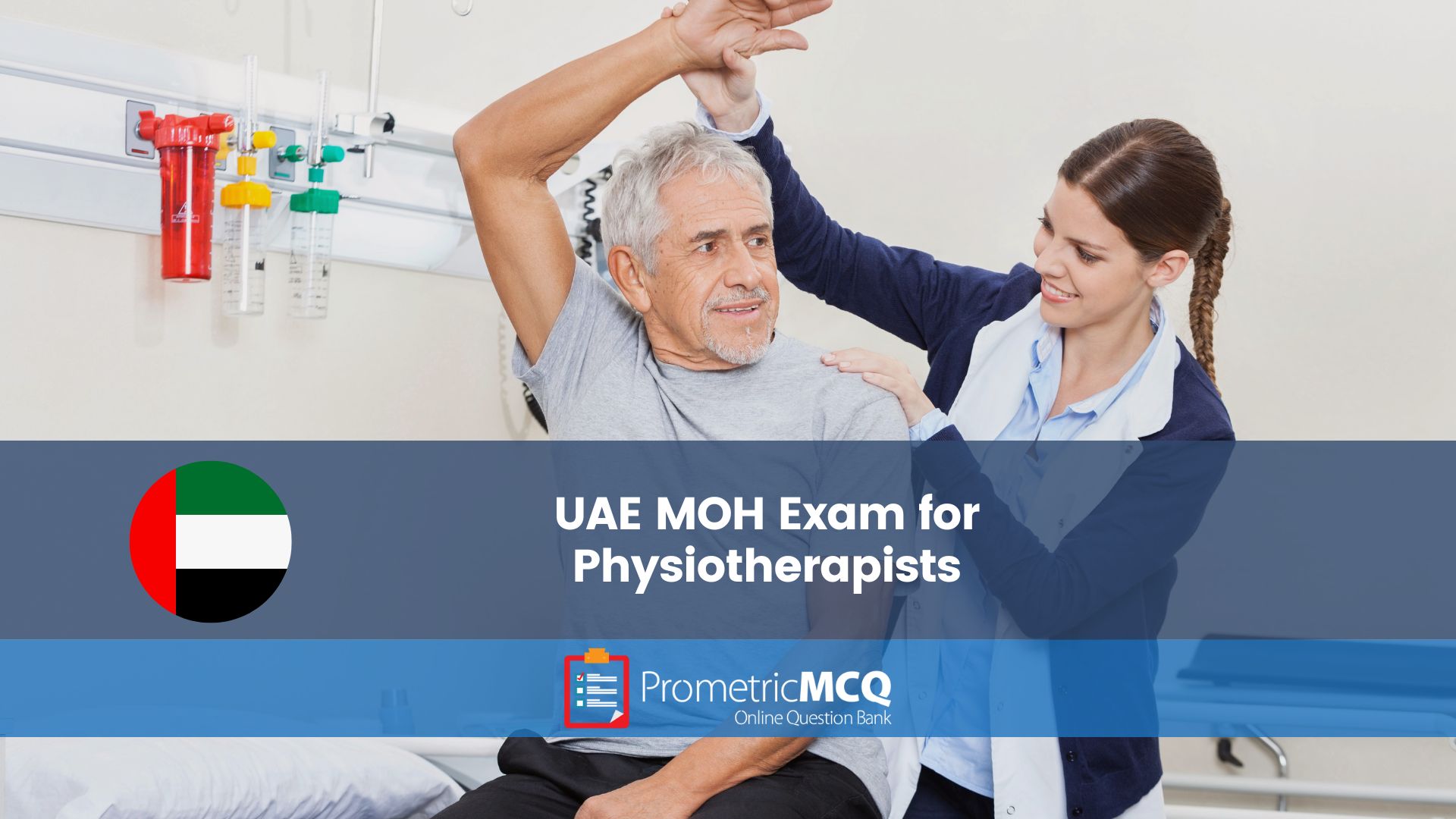
UAE MOH Exam for Physiotherapists
Webmaster2024-03-15T11:54:23+00:00Table of Contents
TogglePrepare for Success: UAE MOH Exam for Physiotherapists
– Practice Tests & Tips
Are you ready to excel in the UAE MOH Exam for Physiotherapists and unlock a pathway to success in your career? Imagine confidently walking into the exam room armed with the knowledge and skills needed to pass with flying colors. The journey to becoming a certified physiotherapist in the UAE is both rewarding and challenging, but with the right tools and strategies, you can conquer the MOH exam and DHA exams with ease.
Here’s what we’ll delve into on this blog:
- Discover expert tips and insider insights for acing the MOH License exam
- Access realistic practice tests that mirror the actual exam format to enhance your readiness
- Uncover key facts about the exam eligibility requirements and application process
- Learn effective study plans and test-taking skills to reduce exam anxiety and boost your confidence
Prepare to take your career to new heights by mastering the essential techniques required to succeed in the UAE Ministry of Health MOH Physiotherapists Exam.
Introduction to UAE MOH and DHA Physiotherapy Exams
The UAE MOH and DHA Physiotherapy Exams hold significant importance for aspiring physiotherapists in the country. These exams are a crucial step towards obtaining certification and advancing one’s career in the field of physiotherapy.
Passing these exams demonstrates proficiency in the required knowledge and skills necessary to practice as a physiotherapist in the UAE. They enable healthcare professionals to demonstrate their expertise, experience, authoritativeness, and trustworthiness (E-A-T) in the field.
The Ministry of Health (MOH) and Dubai Health Authority (DHA) are the governing bodies responsible for administering these exams. They aim to ensure that healthcare practitioners provide safe and effective care to patients.
Successful completion of the MOH and DHA Physiotherapy Exams opens doors to numerous opportunities in both public and private healthcare settings. It allows physiotherapists to work with diverse patient populations and contribute to improving the overall health and well-being of individuals in the UAE.
Preparing for these exams involves thorough study, practice, and familiarity with the exam format and content. In the following sections, we will explore the eligibility requirements, application process, understanding of the exam formats, key study resources, preparation tips, test-taking strategies, and more to help aspiring physiotherapists excel in the UAE MOH Exam for Physiotherapists.
Eligibility Requirements and Application Process for MOH Exam for Physiotherapists
To take the MOH Exam for Physiotherapists in the UAE, aspiring physiotherapists must meet certain eligibility criteria. Here are the key requirements and steps to follow for the application process:
- Education and Experience: Candidates must possess a Bachelor’s or Master’s degree in Physiotherapy from a recognized institution. Additionally, two to three years of minimum relevant clinical experience may be required.
- Licensing and Registration: Before applying for the exams, candidates must ensure they have a valid license and registration from their respective professional regulatory bodies.
- Application Submission: Candidates need to complete the application form provided by the relevant authority, such as the UAE’s Ministry of Health (MOH) or the Dubai Health Authority (DHA). The form should be filled out accurately and submitted along with the required documents, including educational certificates, professional licenses, and identification proof.
- Application Review: The submitted applications are reviewed by the respective health authorities. They will assess the eligibility of the candidate based on academic qualifications, work experience, and other relevant criteria.
- Exam Fees: Once the application is approved, candidates are required to pay the examination fees as specified by the health authority. The fees can vary and should be paid within the given timeframe.
- Exam Scheduling: After completing the application process and paying the fees, candidates will receive confirmation and instructions for scheduling their exams. The exam dates and locations will be provided, allowing candidates to choose a preferred date and testing center.
- Exam Confirmation: Candidates will receive an official confirmation of the exam appointment, along with any additional instructions or requirements for the examination day.
By understanding the eligibility requirements and following the application process diligently, aspiring physiotherapists can take their first step toward preparing for and successfully completing the MOH Exam for Physiotherapists in the UAE.
Understanding the Exam Formats
In order to succeed in the MOH Exam for Physiotherapists, it is crucial to have a clear understanding of their formats. These exams assess your knowledge, skills, and proficiency as a physiotherapist, and being familiar with the structure and types of questions can give you a significant advantage.
Multiple-Choice Questions
The MOH Exam for Physiotherapists primarily consist of multiple-choice questions. These questions are designed to test your theoretical knowledge and understanding of various aspects of physiotherapy. You will be presented with a stem, followed by a list of options, and you need to select the correct answer. It is important to read each question carefully and understand what is being asked before choosing your response.
Clinical Scenarios and Case Studies
In addition to multiple-choice questions, the MOH Exam for Physiotherapists may also include clinical scenarios and case studies. These scenarios simulate real-world situations that you may encounter as a physiotherapist. You will be required to analyze the given information and apply your knowledge to make sound clinical decisions. It is crucial to carefully evaluate the details of each case and consider all possible options before selecting your response.
Time Allocation
Both the MOH and DHA physiotherapy exams have a specific time allocation. It is essential to manage your time effectively to ensure that you can answer all the questions within the given timeframe. Prioritize questions based on your confidence and allocate sufficient time to each section. By practicing timed mock exams and developing efficient time management strategies, you can improve your speed and accuracy in answering questions.
By understanding the formats of the MOH Exam for Physiotherapists, you can better prepare yourself for success. Familiarize yourself with the types of questions, practice analyzing clinical scenarios, and develop effective time management strategies. This will enhance your performance and increase your chances of achieving a favorable outcome in these important exams.
Key Study Resources and Preparation Tips
When it comes to preparing for the UAE MOH Exam for Physiotherapists, having the right study resources and a well-rounded preparation strategy is crucial. Here, we will provide you with valuable study resources and offer tips and strategies to help you effectively prepare for the exams.
1. Study Guides and Textbooks
Start by obtaining reliable study guides and textbooks that cover the relevant topics and content areas of the exams. These resources will provide you with in-depth knowledge and a comprehensive understanding of the subject matter.
2. Online Practice Tests
Utilize online practice tests as a valuable tool to assess your knowledge and gauge your exam readiness. These tests will give you a realistic simulation of the actual exam environment and help you identify areas where you may need further improvement. Check out the following online platforms for practice tests:
– PrometricMCQ.com: Offers a wide range of practice tests designed specifically for the MOH Exam for Physiotherapists. They provide detailed explanations for correct answers and offer timed practice sessions.
3. Study Groups and Tutorials
Consider joining study groups or participating in tutorials to collaborate with fellow candidates and share knowledge and resources. Discussing exam-related topics with others can provide different perspectives and help clarify any doubts or misconceptions you may have.
4. Time Management and Exam Strategy
Develop an effective study plan that allows you to cover all the necessary topics within the available time. Break down your study sessions into manageable chunks, prioritize the areas that require more attention, and allocate specific time slots for practice tests. Additionally, familiarize yourself with the format of the exams and devise a strategy for approaching different types of questions.
Remember, diligent studying and regular practice with mock exams will significantly enhance your chances of success in the MOH Exam for Physiotherapists. Combine these study resources with consistent effort, and you’ll be well-prepared to achieve your career goals. Good luck!
Test-Taking Strategies and Time Management
When it comes to the MOH Exam for Physiotherapists, excelling requires not only in-depth knowledge but also effective test-taking strategies and time management. Here are some valuable insights to help you navigate the exams with confidence:
Managing Time Effectively
- Familiarize yourself with the exam structure and allocate time for each section accordingly.
- Pace yourself and avoid spending too much time on a single question. If you get stuck, move on and come back to it later.
- Utilize the provided instructions and guidelines to optimize your time allocation.
Approaching Different Question Types
- Understand the different question formats, such as multiple-choice, scenario-based, and practical application questions.
- Read each question carefully, paying attention to details and keywords.
- Consider eliminating obviously incorrect options and then use logical reasoning to narrow down the choices.
- For scenario-based questions, analyze the given information and apply your knowledge to select the best answer.
Test-Taking Skills
- Improve your critical thinking and analytical skills to effectively evaluate options.
- Practice mindfulness and remain focused during the exam to avoid unnecessary errors.
- Avoid second-guessing yourself unless you have a valid reason to change your answer.
- Skim through the entire exam at the beginning to get an overview and plan your approach.
Remember, effective time management and strategic test-taking skills can significantly impact your performance in the MOH Exam for Physiotherapists. Practice these strategies during your preparation to build confidence and maximize your chances of success.
Areas of Focus and Topics to Review
To achieve success in the MOH Exam for Physiotherapists, aspiring physiotherapists need to have a clear understanding of the key areas and topics that are the focus of these exams. By prioritizing their study efforts and dedicating time to these specific areas, candidates can enhance their chances of passing with flying colors. Here are some essential areas of focus and topics to review:
1. Anatomy and Physiology
A solid foundation in anatomy and physiology is crucial for any physiotherapist. Pay special attention to essential body systems, such as the musculoskeletal, cardiovascular, and respiratory systems. Familiarize yourself with the structure and function of key organs, bones, and muscles. Additionally, understand the physiological processes that underpin human movement and how they relate to physiotherapy practices.
2. Assessment and Diagnosis
Develop a thorough understanding of various assessment techniques and diagnostic procedures. Review concepts like patient history-taking, physical examinations, and diagnostic tests commonly used in physiotherapy. Learn how to interpret clinical signs and symptoms to identify specific conditions or injuries accurately.
3. Treatment Techniques
Explore different physiotherapy treatment modalities and techniques. Understand when and how to apply them effectively. Topics of focus include therapeutic exercises, manual therapy, electrotherapy, and rehabilitation protocols. Gain insight into evidence-based practice and stay updated on the latest advancements in physiotherapy treatments.
4. Pathology and Pathophysiology
Examine the pathological processes that result in various physical impairments and conditions. Study common musculoskeletal, neurological, and respiratory disorders, including their etiology, progression, and clinical manifestations. Stay informed about current research and findings in the field.
5. Biomechanics and Kinesiology
Acquire a comprehensive knowledge of human movement and biomechanics. Understand the principles of joint mechanics, movement analysis, and applied biomechanics in the context of physiotherapy. Review topics like gait analysis, functional movement patterns, and ergonomic principles.
6. Ethics and Professionalism
Demonstrate your understanding of ethical and professional principles guiding the practice of physiotherapy. Familiarize yourself with codes of conduct, professional responsibilities, and legal considerations specific to the UAE. Develop an ethical framework to guide your decision-making and patient interactions.
Remember, these areas of focus and topics serve as a roadmap for your study and preparation phase. However, while studying for the exams, ensure you maintain a holistic approach by integrating other relevant subjects and updating your knowledge regularly. By prioritizing these areas, you’ll be better equipped to tackle the UAE MOH Exam for Physiotherapists and showcase your expertise in the field. Good luck!
Mock Exams and Practice Tests
Regularly practicing with mock exams and practice tests is paramount to assessing readiness and identifying areas for improvement when preparing for the UAE MOH Exam for Physiotherapists. These simulated examinations provide invaluable opportunities to familiarize oneself with the format, content, and timing of the actual tests. By engaging in targeted practice, aspiring physiotherapists can enhance their test-taking skills and gain the confidence needed to excel on exam day.
Benefits of Mock Exams and Practice Tests
- Assess Readiness: Mock exams serve as a litmus test to evaluate one’s level of preparedness. These practice tests give candidates a raw baseline of their knowledge and skills, helping them gauge their readiness for the actual exams. Through regular assessment, candidates can track their progress and identify areas that require further study.
- Identify Weaknesses: Mock exams reveal specific areas in which candidates might be lacking proficiency. By carefully reviewing the results and analyzing correct and incorrect answers, candidates gain insights into their strengths and weaknesses. This information allows them to focus their study efforts on key areas that need improvement, ensuring a more targeted approach to their preparation.
- Build Test-Taking Confidence: Mock exams simulate the pressures and conditions of the real exams, giving candidates a taste of what to expect. Familiarizing oneself with the exam environment and time constraints helps reduce test-taking anxiety and builds confidence. With each practice test, candidates become more comfortable with the exam format, types of questions, and effective time management strategies.
Effective Practice Strategies
- Create a Study Schedule: Allocate dedicated time for regular practice sessions, integrating mock exams into your study plan. Consistency is key, so aim to take one or two practice tests every week leading up to the exam date.
- Simulate Exam Conditions: Treat mock exams as if they were the real deal. Find a quiet location, set a timer, and strictly adhere to the allotted time for each section. This approach will help you get accustomed to working under time pressure.
- Review Answers and Seek Understanding: After completing each mock exam, thoroughly review your answers, both correct and incorrect. Take the time to understand the reasoning behind each answer. This process will strengthen your knowledge and improve your ability to apply concepts effectively.
- Track Progress and Adjust: Keep a record of your mock exam scores and track your progress over time. Use this information to identify patterns, track improvements, and adjust your study plan accordingly.
Incorporating mock exams and practice tests into your study routine will significantly enhance your preparedness for the UAE MOH and DHA physiotherapy exams. Remember, practice makes perfect, and these valuable resources can make all the difference in achieving success.
Exam-Day Tips and Strategies
On the day of the UAE MOH Exam for Physiotherapists, it’s natural to feel a mix of excitement and nervousness. However, with the right mindset and preparation, you can approach the exam day with confidence. Here are some practical tips and strategies to help you perform your best:
- Start your day right: Get a good night’s sleep before the exam and have a nutritious breakfast to fuel your brain.
- Arrive early: Aim to arrive at the exam center with ample time to spare. This will give you a chance to familiarize yourself with the environment and settle any last-minute nerves.
- Stay calm and focused: Take deep breaths and remind yourself that you have prepared well. Avoid discussing the exam with anxious peers to maintain a positive mindset.
- Read instructions carefully: Take the time to read through the instructions for each section of the exam. Understanding the requirements will help you answer the questions accurately.
- Manage your time wisely: Allocate time for each section based on its weightage. If you encounter a challenging question, don’t dwell on it. Move on and come back to it later if you have time.
- Pace yourself: Don’t rush through the exam. Maintain a steady pace and allocate sufficient time for each question without sacrificing accuracy.
- Review your answers: If time permits, review your answers before submitting the exam. Look for any errors or areas where you can provide additional information.
Remember, staying calm, focused, and confident will greatly contribute to your performance on the exam day. Trust in your preparation and believe in your abilities. Good luck!
Additional Resources for Further Study
Here are some valuable resources that aspiring physiotherapists can explore for further study and preparation for the UAE MOH Exam for Physiotherapists:
- Books: Consider reading authoritative textbooks and study guides specifically tailored to the exam syllabus. Some recommended titles include “Clinical Orthopedic Rehabilitation” by S. Brent Brotzman and Robert C. Manske, and “Physical Medicine and Rehabilitation Board Review” edited by Sara Cuccurullo.
- Websites: Online platforms like PrometricMCQ.com offer quizzes to enhance your knowledge.
Remember, comprehensive preparation involves a combination of self-study, practice questions, and supplemental resources. Tailor your study plan based on your learning style and preferred format.
Conclusion
In conclusion, thorough preparation is essential for success in the UAE MOH Exam for Physiotherapists. These exams hold great significance for aspiring physiotherapists in the country, as they serve as a crucial step in their career advancement. By understanding the eligibility requirements and following the application process, candidates can ensure they meet all the necessary criteria to sit for the exams.
It is important for candidates to familiarize themselves with the exam formats, including the types of questions and time allocation, in order to effectively plan their study and revision. Utilizing key study resources, such as the provided links to practice tests, can greatly enhance exam readiness.
Test-taking strategies and time management skills are also crucial for optimal performance. Candidates should focus their study efforts on the key areas and topics outlined in the exam content, ensuring a comprehensive understanding of the material.
Regularly practicing with mock exams and practice tests is highly recommended to assess readiness and identify areas for improvement. It is advisable to develop a study plan that allows for diligent studying while also managing test-taking anxiety.
On the day of the exam, candidates should employ the strategies and tips discussed to stay calm, focused, and confident. Additional resources for further study, such as books, websites, and study materials, can also be explored to enhance knowledge and understanding.
To achieve success in the UAE MOH Exam for Physiotherapists, candidates are encouraged to invest time and effort in their preparation. By implementing the recommended strategies, candidates can unlock their career potential and pave the way for a fulfilling career as physiotherapists in the UAE.
Remember, thorough preparation is the key to success!
Apply for UAE MOH License
Get UAE MOH Prometric Exam Preparation and Licensing Services

